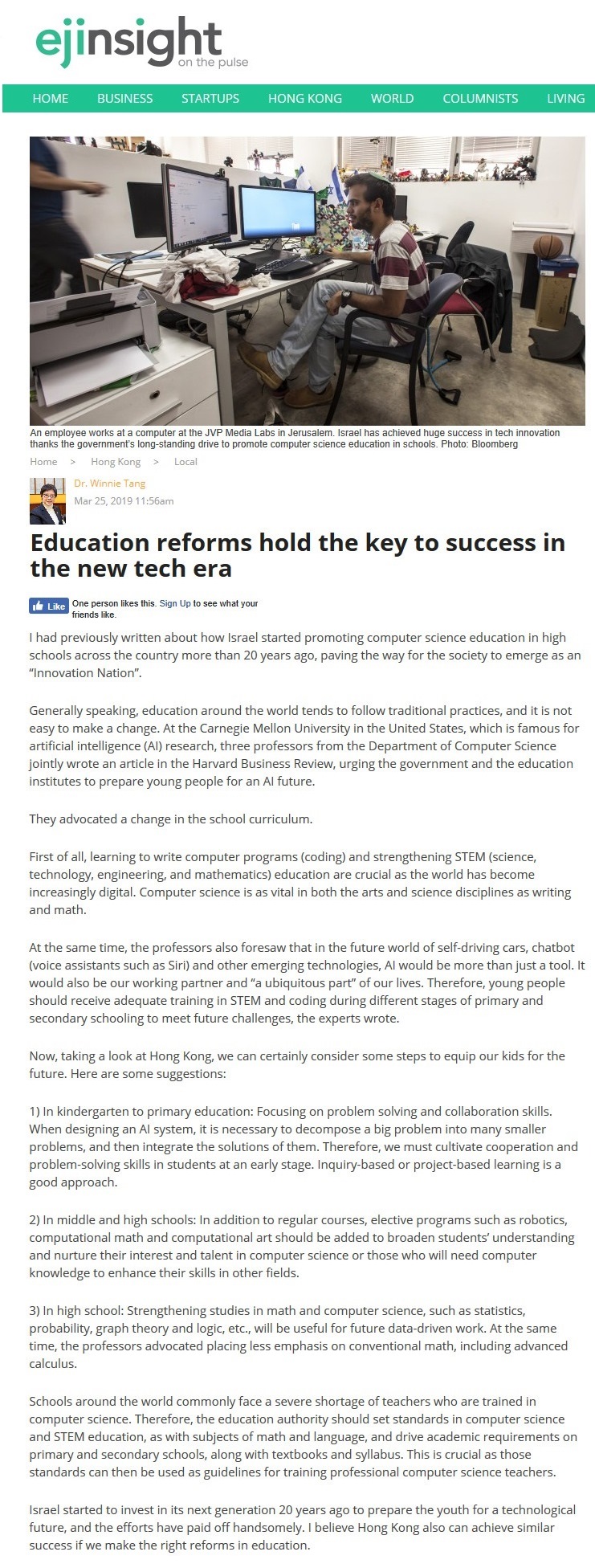上版請按此

Education reforms hold the key to success in the new tech era
I had previously written about how Israel started promoting computer science education in high schools across the country more than 20 years ago, paving the way for the society to emerge as an "Innovation Nation".
Generally speaking, education around the world tends to follow traditional practices, and it is not easy to make a change. At the Carnegie Mellon University in the United States, which is famous for artificial intelligence (AI) research, three professors from the Department of Computer Science jointly wrote an article in the Harvard Business Review, urging the government and the education institutes to prepare young people for an AI future.
They advocated a change in the school curriculum.
First of all, learning to write computer programs (coding) and strengthening STEM (science, technology, engineering, and mathematics) education are crucial as the world has become increasingly digital. Computer science is as vital in both the arts and science disciplines as writing and math.
At the same time, the professors also foresaw that in the future world of self-driving cars, chatbot (voice assistants such as Siri) and other emerging technologies, AI would be more than just a tool. It would also be our working partner and "a ubiquitous part" of our lives. Therefore, young people should receive adequate training in STEM and coding during different stages of primary and secondary schooling to meet future challenges, the experts wrote.
Now, taking a look at Hong Kong, we can certainly consider some steps to equip our kids for the future. Here are some suggestions:
1) In kindergarten to primary education: Focusing on problem solving and collaboration skills. When designing an AI system, it is necessary to decompose a big problem into many smaller problems, and then integrate the solutions of them. Therefore, we must cultivate cooperation and problem-solving skills in students at an early stage. Inquiry-based or project-based learning is a good approach.
2) In middle and high schools: In addition to regular courses, elective programs such as robotics, computational math and computational art should be added to broaden students’ understanding and nurture their interest and talent in computer science or those who will need computer knowledge to enhance their skills in other fields.
3) In high school: Strengthening studies in math and computer science, such as statistics, probability, graph theory and logic, etc., will be useful for future data-driven work. At the same time, the professors advocated placing less emphasis on conventional math, including advanced calculus.
Schools around the world commonly face a severe shortage of teachers who are trained in computer science. Therefore, the education authority should set standards in computer science and STEM education, as with subjects of math and language, and drive academic requirements on primary and secondary schools, along with textbooks and syllabus. This is crucial as those standards can then be used as guidelines for training professional computer science teachers.
Israel started to invest in its next generation 20 years ago to prepare the youth for a technological future, and the efforts have paid off handsomely. I believe Hong Kong also can achieve similar success if we make the right reforms in education.
Dr. Winnie Tang
Adjunct Professor, Department of Computer Science, Faculty of Engineering and Faculty of Architecture, The University of Hong Kong